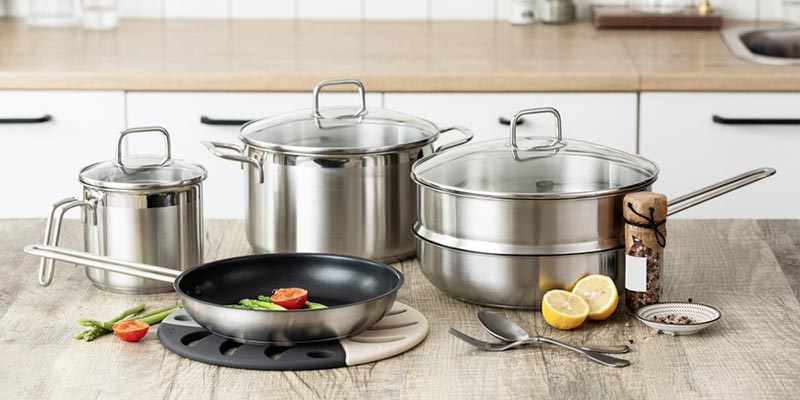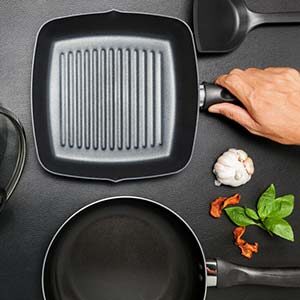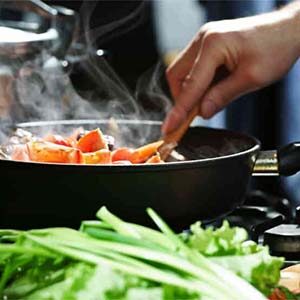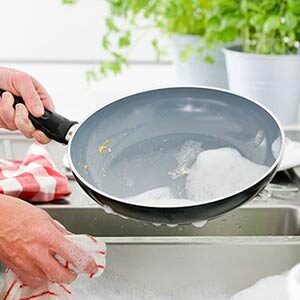Is Die-Cast Aluminum Cookware Safe?

Die-Cast Aluminum Cookware Safe.
Die-cast aluminum cookware is becoming popular day by day. There are many reasons behind it including lightweight, inexpensiveness, scratch resistance, and so on.
But there is also a question in the mind of users that ‘is die-cast aluminum cookware safe?’. If this question also pops up in your mind then you are certainly a health-conscious person.
Basically, there is confusion about the link between aluminum cookware and Alzheimer’s disease, but what is the truth? Does aluminum cookware really affect our health?
In this article, we will cover all the related questions regarding this topic. So, stay with us to know all the facts about die-cast aluminum cookware.
What is Die-Cast Aluminum?
 Die-casting is a high-pressured process that produces textured-surface and smooth metal parts. It is the final product that is created after pouring molten aluminum into a mold.
Die-casting is a high-pressured process that produces textured-surface and smooth metal parts. It is the final product that is created after pouring molten aluminum into a mold.
After machining every pan from a solid aluminum block, this type of cookware was created.
The die-casting process involves 4 main steps. These are-
- Mold Preparation
- Injection of the mold & molten metal
- To eject the newly-created cavity from that mold
- Shakeout- isolating scrap metal from that cavity
This raw material is more sensitive to heat and softer as well. Some of the advantage out of die-cast aluminum is-
- Lightweight
- Durable
- Perfect strength-to-weight ratio
- Cooks quickly
- Amazing electrical conductivity
- Doesn’t rust
- Superior to stainless steel when it comes to heat conduction
- Resists scratching
- Recyclable
- Affordable
- Easy to clean
- Cools down quickly while cooking
How Much Aluminum Doesn’t Harm Your Body?
The fact is if anyone consumes a large concentration of aluminum, there are risks of having toxicity and germs. According to the WHO (World Health Organization), adults can consume 30-50 milligrams of aluminum and it’s not harmful.
Consuming a fair amount of aluminum will not harm your body because this is a common element in our environment. Aluminum is present in a lot of foods, in both nonprescription and prescription medications, and even in water.
Moreover, aluminum is present in antiperspirants, antacids, and aspirin as well. And, the thing is, only a little amount of that you consume is absorbed into your body, the rest of it passes through your digestive tract which is completely harmless.
How Much Aluminum is Transferred Through Cookware?
Although die-cast aluminum cookware can conduct heat excellently, it is reactive to foods that are high in acid or vinegar. If you cook these in aluminum, there are risks of leaching an amount of aluminum into your foods.
Also, it impacts the taste of acidic foods. For example, you will find an unwanted metallic taste in lemon curd or tomato sauce that is cooked in aluminum pots.
The good news is, the amount of leaching aluminum in foods is minimal. According to researchers’ studies, per cup of acidic food that is cooked in aluminum pots and stored in that same pot contains 0.0024 milligrams of aluminum.
However, it only happens when you use an untreated pan (pin it for later, we’ll talk in detail about it). If you use treated aluminum cookware that does not react with foods, then it is completely safe.
For instance, there is anodized aluminum cookware that uses an electrical current and chemical bath and binds the aluminum into your pan.
The Link Between Aluminum Cookware and Alzheimer’s Disease
A myth lives on from 1970 that the patients of Alzheimer’s had an unusually high level of aluminum in their brains. For this, aluminum cookware was linked to the theory of Alzheimer’s.
However, according to a report by the FDA, aluminum is not responsible for Alzheimer’s disease, and the products of aluminum do not affect our health.
Also, a renowned neurologist named Dr. David Perlmutter said that excessive consumption of grains and carbohydrates causes Alzheimer’s disease, not aluminum cookware.
Why a Little Amount of Aluminum Leaches into Your Food from Cookware
 As we said before, you’ll know why not much aluminum leaches into your food from cookware, here is the reason. The fact is, aluminum cookwares are coated with a layer.
As we said before, you’ll know why not much aluminum leaches into your food from cookware, here is the reason. The fact is, aluminum cookwares are coated with a layer.
When you leave aluminum cookware exposed to air, it will create a thin layer of aluminum oxide. This is completely a natural process and the layer forms on the surface of the cookware.
And, this layer forms a barrier between the air and the aluminum which prevents the aluminum from further oxidation. This process is called ‘passivation’ which means it converts the metal into passive against reactive.
After that, the metal goes through an electrical process for making the aluminum oxide layer thicker. The process is called ‘anodization’. Now, you may guess the reason, the thicker the layer is, the less aluminum will leach into your food.
This anodized layer of aluminum oxide is a part of your cookware and you cannot peel off it. For this, it works great to prevent any scratch and expose the aluminum core inside.
Also, die-cast aluminum cookware come up with Inoble coating or Ceramic coating. These are amazing non-stick coatings on the surface of aluminum cookware that prevent the chemical from leaching into your foods.
The height of Ignoble coating is between 50-150 mm that makes it scratch resistance. Also, Ignoble coating ensures excellent durability while cooking.
Ceramic coating is mainly recommended for casserole and pots. This coating generates only a few rays and ensures this is a safe method of cooking. Also, this coating retains the natural flavor of your food ingredients. This is completely PTFE & PFOA chemical-free.
Is Die Cast Aluminum Safe?
In this section of the article, you may have an idea about what the answer could be. Yes, after all the discussions, take ‘yes’ as an answer. Although there’s a little risk of leaching aluminum to your foods, this is not enough to claim it unsafe.
Additional Tips to Use and Care a Die Cast Aluminum Cookware
 Here are some additional tips that will help you to properly use and care for your die-cast aluminum cookware.
Here are some additional tips that will help you to properly use and care for your die-cast aluminum cookware.
- Wash the pan in hot soapy water before you use it for the first time. After washing it well, dry and season the pan using oil or butter.
- Do not overheat your pan ever. Medium or low heat (maximum 200-240 degrees centigrade) is enough to obtain the best cooking result.
- Use the pan only for cooking instead of using it for conserving the food as well.
- Do not cut your food in the pan.
- Use only nylon or wooden utensils.
- Once you’re done with using the pan, leave it for some time. Then clean it using hot soapy water and then dry it perfectly.
- Avoid using harsh chemical cleaners to clean your pan, if possible.
Conclusion
We are done with today’s discussion. Are you still confused about whether die-cast aluminum cookware is safe or not? Hopefully, you are not. Because we tried our best to come up with a fair answer to the question.
Lightweight, amazing corrosion resistance, high dimensional stability, high level of electrical and thermal conductivity, and a whole lot more you can get from die-cast aluminum cookware. You can also read about cast iron cookware brands to differentiate between die-cast aluminum cookware.
And luckily, at the same time, this is safe to use. If you use and care for your cookware properly, there is nothing to worry about its effects on your health.



